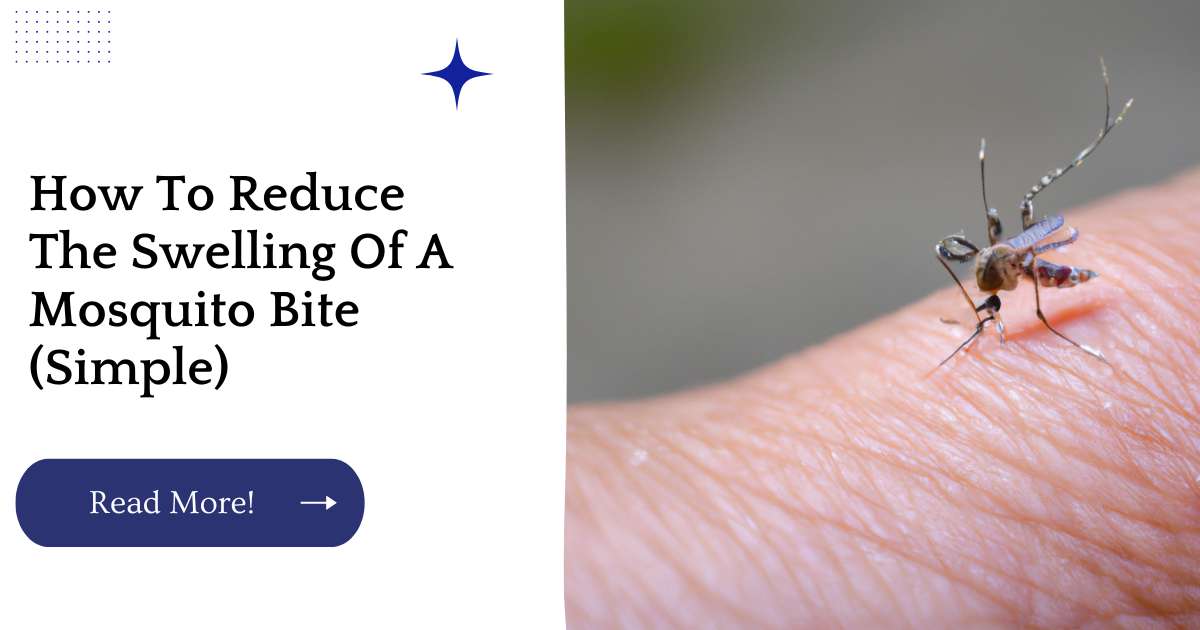Everyone gets mosquito bites, but it seems like some people get them worse than others. Sometimes a mosquito bite can swell up to the size of a golf ball and feel excruciatingly painful.
Luckily, there are many ways to deal with this problem without resorting to medications or expensive treatments. Below are some tips for reducing the swelling after being bitten by an insect:
| Takeaways |
|---|
| Prevention is key to avoid mosquito bites and the discomfort that comes with them. |
| Applying a cold compress can help reduce swelling and itchiness from mosquito bites. |
| Over-the-counter medications and natural remedies can also provide relief from mosquito bite symptoms. |
| Keeping the bite clean and avoiding scratching can prevent infection and further irritation. |
| Properly covering up and using mosquito repellent when spending time outdoors can help prevent bites from occurring. |
Applying Heat
Heat can help reduce swelling and inflammation. There are a few ways to go about this, but the most common method is to take a hot shower or bath, and then apply an ice pack to the area for at least 20 minutes.
If you don’t have access to an ice pack or prefer not to use one, you can also try placing a warm washcloth directly on top of your bite.
How long should I leave it on? It depends on how much swelling you have—for smaller bites, 10-15 minutes is plenty; more severe cases will require longer contact with heat (about 30 minutes). Try not to overdo it, though—you don’t want to burn yourself!
What kind of heat should I use? The best thing about using heat as a remedy for mosquito bites is that there aren’t many contraindications for using it outside of burns or other injuries from contact with fire/burns (in which case we recommend seeking medical advice).
Most people can just jump in the tub and let their skin soak up all the goodness that comes with being submerged in water!
Since soaps tend not only contain chemicals which might irritate sensitive areas already affected by bites but also aggravate any open wounds themselves (even if they’re only superficial), it’s always better safe than sorry when dealing with such delicate skin conditions like rashes caused by insect stings – especially since these tiny little insects seem intent upon attacking us all summer long.
Prevention is the best way to avoid the discomfort of mosquito bites. Our guide to getting rid of mosquitoes offers simple solutions to ensure that you won’t have to deal with the nuisance of mosquito bites ever again.
Using Apple Cider Vinegar
Apple cider vinegar is a natural home remedy that can reduce the swelling of a mosquito bite. It can also help with the itching and irritation you may feel on your skin.
To use apple cider vinegar, simply wet a cotton ball with it and apply it directly to the affected area.
You should do this at least once per day until you start seeing results. It’s best if you allow for about 15 minutes for the vinegar to soak in before dressing yourself again.
Apple cider vinegar will not stain clothing or leave an unpleasant odor behind once it has been applied properly!
If there is no improvement after using apple cider vinegar for three days, it is probably not going to help much with this particular issue; however, there are many other ways that you can use apple cider vinegar as well:
| Benefits of Using Apple Cider Vinegar for Mosquito Bites |
|---|
| Helps reduce itchiness and inflammation |
| Contains acetic acid and anti-inflammatory properties for soothing relief |
| Natural remedy that is affordable and easily accessible |
| Can be applied topically or taken orally for additional health benefits |
Applying A Cold Compress
If you’ve been bitten by a mosquito, the swelling may be exacerbated if you scratch or pop it. The first thing to do is cover the bite with some sort of compress.
You can use anything that can retain moisture and keep the area cold a washcloth soaked in ice water would work well, but so would an Ace bandage or any other kind of material that’s capable of retaining moisture.
If you don’t have access to either, simply apply pressure directly to the swollen area and hold it until your hand gets numb (which will probably take a while).
When applying your compress, try to keep it on for as long as possible: 45 minutes at least, but ideally longer than an hour if possible (and at most two hours).
Every two hours should be fine; every four hours might suffice if you’re not going anywhere or doing anything too strenuous afterward.
Don’t let mosquitoes ruin your outdoor fun this summer. Our proven methods to keep mosquitoes away are guaranteed to keep those pesky insects at bay, so you can enjoy your time outside in peace.
Applying Aloe Vera
Aloe vera is a natural anti-inflammatory that can help reduce the swelling and redness of a mosquito bite.
Apply aloe vera to the bite itself, as well as to the surrounding area. You may also wish to apply aloe vera after your bath or shower (before bedtime).
Using A Hot Spoon
One of the easiest ways to reduce the swelling of a mosquito bite is by placing a hot spoon on it. However, do not burn yourself in the process.
Use a clean spoon and avoid metal spoons as they can cause burns. Do not leave the spoon on your skin for more than a few seconds at most, as this could result in mild burns.
Applying Ice First, Then Heat
Applying ice first, then heat
For swollen mosquito bites, you can use the following method to reduce swelling and alleviate itchiness:
- Apply ice for 20 minutes at a time. This will help limit the amount of swelling.
- After the 20 minutes have elapsed, apply heat (a hot towel or compress) to your bite for 20 minutes at a time. The warmth will ease pain and inflammation associated with the bite.
No one wants to be covered in mosquito bites. By following our easy and effective guide to mosquito repellent, you can ward off mosquitoes and enjoy the great outdoors itch-free.
A Dab Of Toothpaste
Toothpaste is an easy way to dry out and soothe a mosquito bite. Apply a dab of toothpaste to the bite, let it dry for 10 minutes (this will help reduce swelling), then rinse off with water.
If you don’t have any toothpaste handy, try using salt instead. Salt has many of the same properties as toothpaste—it’s just as effective at drying out skin and soothing irritation—and it’s something you likely already have on hand.
Taking An Antihistamine
If you have a severe allergy to mosquito bites, your doctor may prescribe an antihistamine. Antihistamines reduce the body’s reaction to the bite, making it less swollen and irritated.
They come in tablet form or as a cream that can be applied to the area of swelling. Some antihistamines are also available as sprays that can be used on an individual mosquito bite or multiple bites at once.
Using An Aspirin Paste
Aspirin paste is an effective treatment for mosquito bites. Simply dissolve two aspirins in a small amount of water and apply the mixture to the area where you were bitten. Aspirin acts as an anti-inflammatory, reducing redness and swelling.
However, aspirin can cause stomach bleeding if taken on a regular basis (including when used as a paste), so avoid using it on children under age 12 or if you have certain medical conditions such as ulcers or liver disease.
Keeping mosquitoes out of your yard is the best way to prevent bites altogether. Check out our solved guide to keeping mosquitoes away from your yard for practical solutions to this common problem
Concocting Baking Soda And Water
It’s time to start mixing:
Stir 1/2 teaspoon of baking soda into 3 tablespoons of water. This will give you a thick paste that is easy to apply and stays put once on your skin.
Apply the paste directly to the bite and leave it on for 20 minutes (or as long as you can stand). If it gets too dry, just add more water when you reapply it later in the day or evening as needed—you want to keep adding water until all of the baking soda has been absorbed by your skin rather than sitting on top like an annoying layer of dirt!
Rinse with warm water when your time is up, then pat yourself dry before applying any other products or bedding down for the night (unless sleeping with clothes on makes you feel grossed out by this point in life…then go ahead).
Do this daily until swelling goes away completely; if necessary, repeat every couple days after that point as well until swelling goes away fully so no scarring remains behind from where those pesky mosquitoes got their way with us!
Mosquito bites can be a real pain, but they don’t have to ruin your day. Follow our easy tips to get rid of mosquito bites and you’ll be feeling relief in no time.
Avoiding Scratching And Rubbing The Bite
Scratching, rubbing and picking at the bite can cause infection, further swelling and even breakage of the skin. The best thing to do is to avoid scratching or rubbing the area around your bite in any way possible.
Conclusion
We hope you’ll find one of these remedies to be helpful in reducing the swelling of your mosquito bites.
Remember not to scratch or rub the area, because this can make it worse. If all else fails, try seeing a doctor for prescription medication or over-the-counter pain relievers like ibuprofen.
Further Reading
Here are some additional resources to help you learn more about mosquito bites and how to treat them:
CDC’s Mosquito Bite Symptoms and Treatment: The Centers for Disease Control and Prevention provide information on mosquito bite symptoms and how to treat them.
Home Remedies for Mosquito Bites: Healthline offers practical and natural home remedies to treat mosquito bites.
How to Get Rid of Mosquito Bites: Prevention provides simple yet effective solutions to get rid of mosquito bites and their annoying symptoms.
FAQs
What are mosquito bites?
Mosquito bites are small, itchy bumps that occur when a mosquito bites your skin and feeds on your blood. Mosquito bites can cause redness, swelling, and itching.
Why do mosquito bites itch?
Mosquito bites itch because your body reacts to the mosquito’s saliva, which contains anticoagulants and proteins. This reaction triggers the release of histamine in your body, which causes the itching and swelling.
How long do mosquito bites last?
Mosquito bites typically last for a few days up to two weeks. The duration can depend on how severely you react to the bite and if you scratch or irritate the bite.
Can mosquito bites be dangerous?
Yes, mosquito bites can be dangerous if the mosquito is carrying a disease. Mosquito-borne diseases such as malaria, Zika virus, and West Nile Virus can cause serious illness in some cases.
How can I prevent mosquito bites?
You can prevent mosquito bites by using insect repellent, wearing protective clothing, and keeping your environment clean and free of standing water.

Hello! I’m Hellen James, and I write about how to keep pests from invading your home. For the last 10 years, I’ve been working in pest control and am excited to share my expertise with you!


